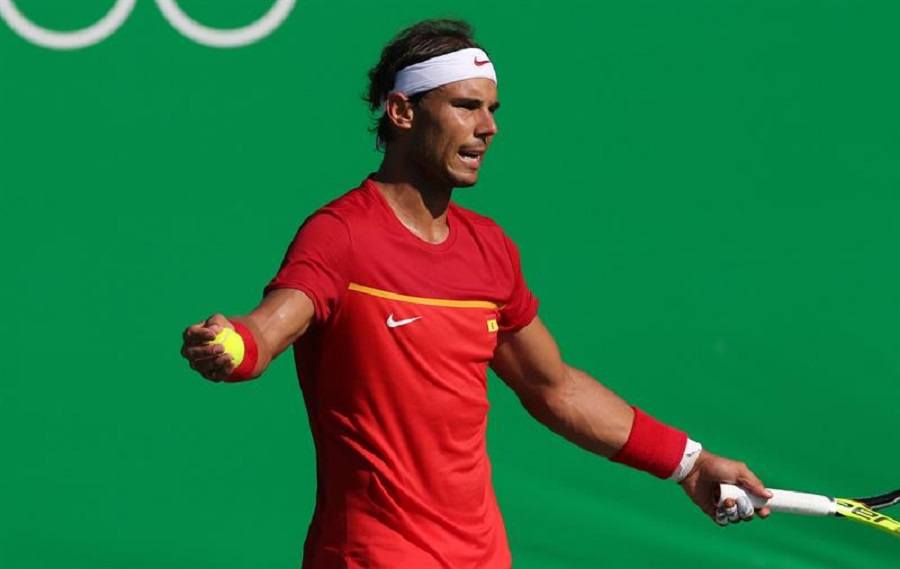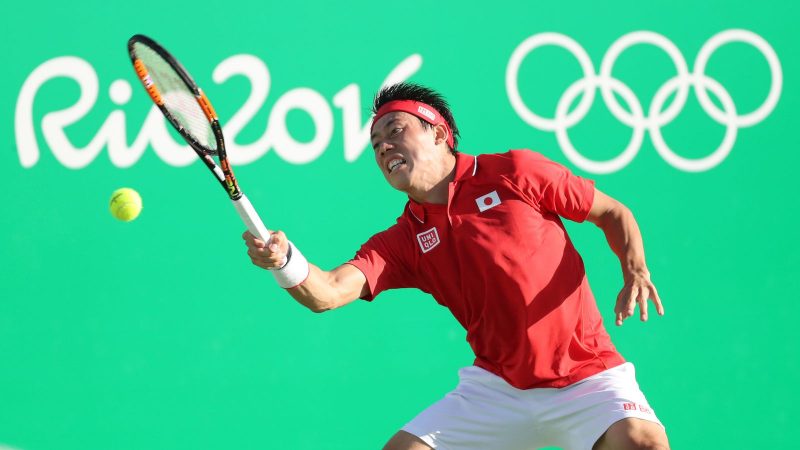
Rafael Nadal worked hard to overcome his wrist pain throughout the 2016 Rio Olympics, but Kei Nishikori was able to take advantage of the fact that Juan Martin Del Potro had pretty much exhausted the Spaniard.
The Japanese world No7, who spends nearly as much time on the physio’s table as on court and who tested Andy Murray seriously in the first semi-final on Saturday, beat Rafael Nadal 6-2, 6-7 (1), 6-3 on a well-patronised Court One in front of a crowd who probably had not expected such a feisty encounter for third place.
The air seemed to have been sucked from Nadal’s game after he had left everything on court 24 hours earlier against Juan Martín del Potro in the second semi‑final, which lasted three hours and eight minutes. Yet, from somewhere, the Spaniard found the will to fight when other options appeared easier.
It was not a contest that would have pleased Piers Morgan, whose lust for a headline is matched only by his annoying ability to create one out of thin air and who enraged his battalions of social media snipers all week when he belittled the concept of silver and bronze medals at the Olympics. It was tempting at several points in the third-place play-off to say he had a point, yet the evidence before us told another story.
Alongside ego at the highest level resides pride – and Nadal’s was taking a battering at a set and 2-5 down when he identified hesitancy in his opponent and decided to seize the moment. He broke twice, saved match point to level and dragged the wretched Nishikori into a tie‑break, where he thrashed him for the loss of a mere point.
So, on a day when they might have been better employed packing to go home or on to Cincinnati or New York ahead of the US Open, which starts in a fortnight, they were asked to go one more round. Nishikori must have felt like a heavyweight contender poised over a falling champion with a finishing left hook, only to slip in the execution of the blow and fly through the ropes. But he too found something extra. It is what makes them special.
America could not lose in the mixed doubles final, where Jack Sock teamed with Bethanie Mattek-Sands to beat their compatriots Venus Williams and Rajeev Ram 6-7 (3), 6-1 (10-9) in an hour and 45 minutes of keenly contested tennis.
In the women’s doubles final at the end of a productive week in difficult conditions, Ekaterina Makarova and Elena Vesnina stood on the highest deck of the podium, smiling in the afternoon sun and draped in gold on behalf of their benighted nation. They defeated the Swiss pair of Timea Bacsinszky and Martina Hingis 6-4, 6-4 handily enough in an hour and 38 minutes on a sweltering allegedly winter’s day.
Tennis was the first of the 28 sports at these Olympics to forgive the Russians for the shameless state-run doping program, an endorsement that did not smack of prudence. There is no suggestion that either winner had doped, but wider suspicions linger.
Maria Sharapova, infamously, is absent. She would have given the Russian team a considerable boost but for having to put the finishing touches to her postponed appeal for a drugs ban, which the court of arbitration for sport is due to hear next month.
Elsewhere, it was an afternoon of rolling consolation for those more active on court. Lucie Hradecka and Radek Stepanek gave their Czech team-mates something to cheer about when they beat the fourth seeds from India, Sania Mirza and Rohan Bopanna 6-1, 7-5 in an hour and 11 minutes on Court One for the mixed doubles bronze. It was the sort of event family and friends would enjoy barbecue around at the neighbors.
There are worse ways to spend a Sunday afternoon, perhaps.


